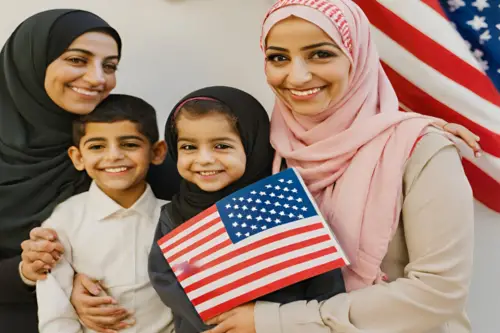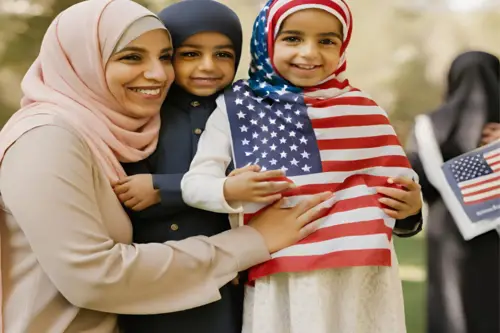We discuss the Muslim immigration challenges Muslims face when coming to the United States, including profiling, stereotyping, travel bans, and extra visa scrutiny.
We also share why Muslims choose to come to the US to challenge stereotypes and their importance to the United States economy. Lastly, we'll share uplifting stories of Muslims who've overcome challenges in immigration.
As we talk about these issues, we trust that our content will connect and inspire you.
@joshisimmigration #uscis and #statedepartment discriminate against #muslims with ridiculous delays but you can fight back #muslimtiktok #iran #pakistan #sudan #immigration #immigrationlawyer #visa #administrativeprocessing #mandamus #greencard #citizenship
Profiling and Stereotyping
A significant problem is when people are singled out because of their Islam or Muslim identity. This causes delays and extra checks during immigration. It's important to understand that immigration policies, like the Immigration and Nationality Act, should be fair. It shouldn’t continue stereotypes.
Muslim Immigration to the US: Factors
We must explain why Muslims move to the United States to challenge stereotypes. Muslim immigration to the United States is influenced by different reasons, impacting the country's economy.
1. Refuge:
Muslims have come to the US seeking safety due to unfortunate events in their primarily Muslim home nations. Issues like tyranny, persecution, poverty, and wars have pushed skilled and wealthy immigrants to North America. For instance, Asians faced expulsion from Uganda, and Saddam Hussein's actions against the Kurds led to a significant mass departure.
2. Education:
In the 1990s, numerous Muslims were attracted to US colleges and universities. The superior facilities, broader political freedoms, and better economic opportunities led many to choose permanent residency in the US. Notably, medical students found the US environment favorable, most opting to stay.
Muslim Immigration to the US: Impact on the Economy
Muslim immigrants have significantly contributed to the US economy, bringing diverse skills, talents, and perspectives. This influx has been particularly notable, where Muslim business leaders have played pivotal roles across various sectors. Their contributions have led to job creation, innovation, and economic vibrancy.
Many Muslim immigrants choose to stay in the US permanently due to factors like higher incomes. Other factors include educational opportunities and the perception of political freedom. This permanency contributes to a continuous and sustained impact on the American economy.
Muslim immigrants come to the US for refuge and education. Each group contributes uniquely to the United States’s economy.

Travel Bans
Muslim immigrants come to the US for safety and education. These immigrants want to pursue their ambitions and contribute uniquely to the US economy. The Muslim immigration travel ban has left families often separated with their dreams deferred and individuals marginalized. Examining the impact of such policies on those affected is crucial.
Increasing Visa Scrutiny
In addition to travel bans, there's been an increase in Muslim immigration visa application scrutiny from majority Muslim countries. Countries included are Middle Eastern countries: Iran, Mauritania, Oman, Saudi Arabia, and South Asia countries: Afghanistan, Pakistan, and Indonesia, among others.
Lengthy processing times, heightened background checks, and added documentation requirements may be required if your country of origin is the Middle East, North Africa, South Asia, or any other Muslim-majority country.
The Impact on the Muslim Community
Beyond legal aspects, discriminatory Muslim immigration policies impact the Muslim community, fostering feelings of alienation, fear, and frustration. Solidarity and understanding from all corners of society are necessary for collective empowerment.
How Muslim Entrepreneurs Influence and Shape US Business
Despite biases, Muslim entrepreneurs have significantly shaped the American business landscape. They’ve managed to make profound contributions to the US economy.
Economic Contributions
Muslim entrepreneurs play a crucial role in boosting the US economy. They create jobs, drive innovation, and expand businesses, bringing energy to various sectors.
Innovation and Technology
Many Muslim entrepreneurs lead in tech innovation, founding disruptive companies. Their contributions shape the business landscape, showcasing that innovation has no limits.
Diversity and Inclusion
Muslim entrepreneurs enrich the US business scene, promoting diverse perspectives and driving creativity. Their dedication to diversity benefits businesses and society.
Global Business Connections
Muslim entrepreneurs bring an international perspective, fostering global connections and partnerships. This strengthens ties between the US and other countries, showcasing global business connections.
Social Impact
Beyond boosting the economy, many Muslim entrepreneurs are involved in charitable activities and social impact initiatives. Their businesses are dedicated to positive social change, addressing community needs, and contributing to a fairer society.
Breaking Stereotypes
Muslim entrepreneurs break Muslim immigration stereotypes and change how people see the Muslim community in business. Their success stories inspire and help shift people's ideas about Muslims.

Inspirational Muslim Immigration Success Stories
These stories show how immigrants in the US can succeed despite Muslim immigration challenges. Let them inspire you as you pursue your dreams in the United States of America.
Noubar Afeyan
Born in Lebanon, Noubar Afeyan moved to Canada as a teen. After college, he came to the US, earned a Ph.D. at MIT, and started companies. He started his first company at 24, ran it for a decade, and founded or co-founded five more companies.
Noubar Afeyan and Anna Afeyan are linked to groups like the Aurora Humanitarian Initiative and the Afeyan Foundation. They’re giving $2 million to help more than 100,000 people. These people had to leave their homes in Artsakh (Nagorno-Karabakh) due to the attacks in September led by Azerbaijan.
Lina Akter and Her Husband
Lina Akter, an American Muslim, and Her Husband: Lina and her husband faced immigration problems in the US. Mixed advice and delays from their congressman's office frustrated them. Lina found expert help with Josh and his team.
Lina and her husband’s immigration success highlights the importance of research and avoiding misguided advice. Lina encourages others not to be overwhelmed when challenging a government agency.
Muslim Immigration and Moving Forward
Discussing Muslim immigration bias is vital, but exploring solutions with a Los Angeles immigration lawyer near you, and advocating for change is equally important. Open conversations, cultural awareness, and working towards inclusive immigration policies can pave the way for a more equitable system.
Chart Your American Dream Beyond Challenges!
Starting the US immigration journey as a person from a Muslim-majority country may have its Muslim immigration challenges. Yet, the success stories of those before reveal endless possibilities.
Their contributions to US businesses highlight the valuable diversity in America. If you're dealing with issues related to Muslim immigration, share your situation for a free evaluation.
Let's work together to achieve your American Dream. Josh and his team of immigration experts are here to help you at every stage, guiding you on a successful journey towards the United States.
Posted in: Blog
